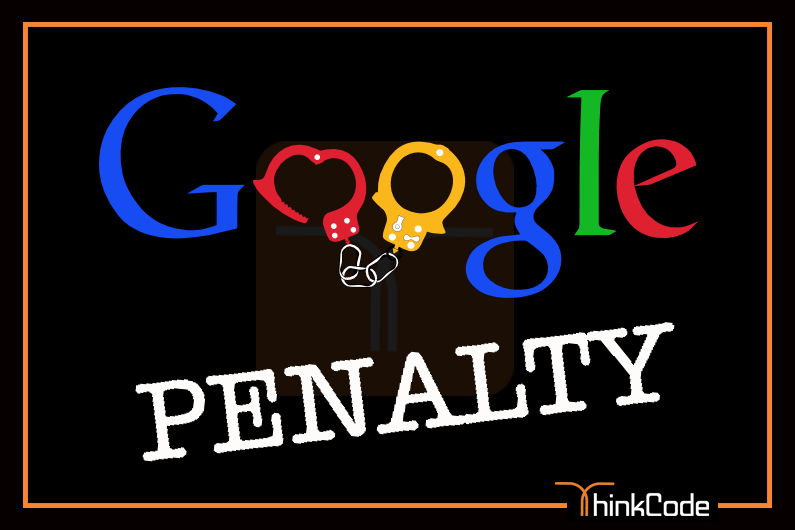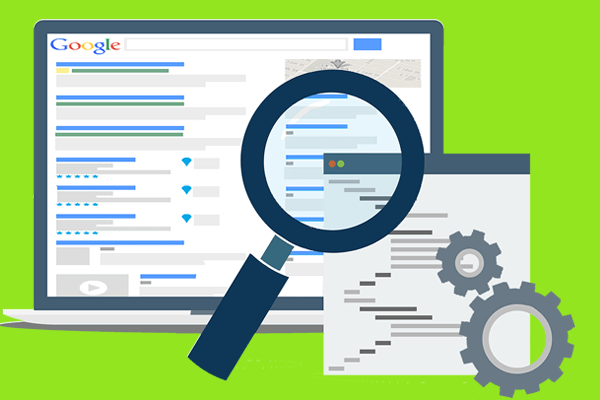
by ThinkCode | Jan 19, 2016 | Search Engine Optimization
If Website is get penalized by any algorithms, how would we come to know it?
There are a lot of websites who indicate if your website got some problems. But you can do some research on Google
You can do that first (if you have Google Webmaster Tools) login to the account and you will see there if you are under penalties or not.
There are 2 types, one is Manual Penalty: A human (probably from the webspam team), imposed a penalty to your website. This can happen because of a number of reasons and it can be either site-wide i.e. affecting the website as a whole or partial i.e. affecting only some pages of your site.
When this is the case, Google will give you an indication of what the problem is together with a list of actions you can take to correct the issues. Once you make the necessary changes, you can submit a reconsideration request and they will tell you if the penalty has been removed or not.
The other is Algorithmic Penalty: This is the most common type and it is automatic. Algorithmic penalties are not reported to webmaster.
If you think a website’s visibility/SERP’s has been penalized from a Google update and there are no manual penalties in your Google Search Console, here is a method to check the validity of your hunch.
- Want to look for your website visitors. Go to Acquisition > Source/Medium
- The click “google / organic” which will let you segment this channel.
- Change the report dates to include several months behind when you suspect the website was affected by a Google search update. * Note normally we include at least a whole previous year of data to rule out a false positive from seasonality.
- Using the report’s graph look for a sharp downward trend which maintains itself over a few weeks or months. Depending on the time frame of the report you might want to change the graphs display to weeks or months.
- If you find a consistent dip take note of a few weeks during and around the traffic loss.
If you find a match between a date of known Google algorithm update and the loss of traffic both the above websites offer additional information about the type of update. Also like to mention there are a few services, such as Fruition, that offer “Penalty Checkers” services that we have found helpful.

by ThinkCode | Dec 21, 2015 | Search Engine Optimization
A question like this is really to general to be answerable. To be able to qualify a person to handle SEO for you, you need to understand SEO principles yourself. Then, ask the person you are about to hire questions based on your own knowledge of the answers.
It would depend on whether you were hiring a full-time in-house SEO (an employee) or a consultant/agency to which you wish to outsource your SEO. It also depends on whether you’re looking to rank in local listings for local goods/services or wanting to compete nationally or internationally. These are very different skillsets.
When inviting candidates for an interview ask them to have a look at your website with their “SEO-glasses” on beforehand also ask them to bring/prepare examples of SEO projects they have done before and how these performed and how they could relate to the present job situation/your websites. As a minimum, check their references on LinkedIn and call those persons listed as references. Nothing beats a one-on-one conversation on the phone about a potential employee with his/hers previous employers.
We believe the questions you need to ask should be centralized around your SEO goals and how this person plans to accomplish these goals. We assume that because you are part of this group, you have a least the very basic knowledge of SEO in general, so ultimately, we would wait to hear how this person responses to my SEO goal then decide who is a better fit In our opinion, if you are not extremely knowledgeable about SEO, your best approach to interviewing a potential SEO candidate is to pay someone with a lot of SEO experience to interview them for you. Otherwise, the candidate might “seem” impressive while all the while blowing smoke.

by ThinkCode | Dec 15, 2015 | Search Engine Optimization
SEO will still be important, it’s just changing and digital marketers need to understand how SEO has evolved. “Old School” SEO doesn’t work as well and can get a site penalized. SEO is blending with social media and requires a strong content marketing strategy. Social signals (people sharing the content) and links from authority sites are the focus and can produce the best results.
Also, obtaining traffic from major sites where your target audience hangs out is more important than just achieving a page one ranking in Google. Total traffic is the new goal as opposed to just a page one ranking.
What we see becoming a major part is branded search – ranking for a business name as part of a keyword phrase. Customers are searching to see a business’ reviews, testimonials, social media activity and helpful content posted about their niche before they decide to do business with them. Creating an optimized branded network can provide a competitive advantage for your clients. It needs to be mobile responsive as well.
Also optimizing content specifically for keyword phrases is evolving into creating content that is topical and can rank for more broad terms. However, you still need to look at the competitiveness of the content in order to rank. However, even posting competitive topics to social media groups can get targeted traffic and can be shared.
Lastly, video is going to become even more important both individually, as well as part of media rich posting (video, images and text with links out to authority sites.) We have developed an interactive video platform for marketers to help them get more results from their video marketing efforts. In two years or so, the major of content posted will be video according to the latest statistics.
[easy-tweet tweet=”SEO was, is and will be important for Digital Marketing. ” hashtags=”#seo #google”]The only thing is now it must be smart and strategic.

by ThinkCode | Dec 10, 2015 | Search Engine Optimization
Rankings are pretty much worthless these days due to personalization and localization. Google shows different results depending on your previous searches (search history). They also change depending on which results you clicked on previously and likely whether or not you bounced once you clicked through.
Additionally, rankings in New York are totally different than those in Miami which are different than those in Houston which are different than those in Los Angeles. Results vary even more widely between countries.
If you’re looking for fairly reliable rankings in the US, for example, you would need to pull rankings for the same keyword in 25-50 major cities around the country (using proxy IPs that resolve to each of those cities) and then average them. Also need to clear search history, cookies, etc. after each individual pull.
If you want to do a spot check to see if a site comes up on the first page or two of Google, we will turn on a VPN which anonymizes my IP address and changes my location to something semi-random. We use private browsing too. It’s interesting to see how different the search results are when this is done.
Remember that search engine results are now highly contextual to the searcher’s environment, GEO, device, history etc. With so many variables unique to the individual searcher you will never be able to replicate the same context and develop a reliable ranking report by which to track progress. You can make some generalities; however these results will often be misleading and could result in your pursuit of false goals.
The best way to influence search results is to build a massive Google+ network because it really pays off. When people in your network (which include your 2nd and 3rd degree connections) perform a search for a product or service that you’re relevant for, all things being equal, you will appear higher to that searcher than sites that are not in any way linked to the searcher. This is particularly relevant to local search.
Below is the list of few tools which you can use for keyword ranking
- Advanced Web Ranking: – It can be configured to different locations.
- RankTrackr:– Track rankings with precise accuracy in an area of your choice.
- seomonitor.com – You can monitor you campaign evolution and immediately spot new opportunities that can help you grow your traffic, conversions and revenue.

by ThinkCode | Nov 30, 2015 | Search Engine Optimization
It was officially launched in July and has been rolling out quite slowly (per Google). We all know an article came out on the 22nd of October, describing a possible change in the algorithm. Is anyone else seeing this decline, if so, how are you going about fixing it? Content?
Google Panda is being rolled out slowly. If you are seeing a slow decline, ideally use good industry tools, such as, BrightEdge’s ‘Data Cube’, Linkdex’s or Search Metric’s ‘Visibil
It was officially launched in July and has been rolling out quite slowly (per Google). We all know an article came out on the 22nd of October, describing a possible change in the algorithm. Is anyone else seeing this decline, if so, how are you going about fixing it? Content?
Google Panda is being rolled out slowly. If you are seeing a slow decline, ideally use good industry tools, such as, BrightEdge’s ‘Data Cube’, Linkdex’s or Search Metric’s ‘Visibility’ section, to see where your content is the poorest and then review and enhance your content by reviewing: quality and uniqueness of top category and product copy etc. Review duplicate content and take action. You can use canonicals (page-a is the same as page-b) and if you are really stuck and have a huge website you can consider “noindex” but the reality is you should not have any pages that are so poor you need to hide them from an engine, so focus on quality content. Remember, you will have to wait for the next Google Panda update to even be considered for a recovery, it’s unlikely you have been hit by a manual penalty as your decline will be more prominent.
Regarding RankBrain, don’t worry about this for rankings as it is in essence a add-on to index stemming and it’s like dictionary 2.0, if you like, to enhance synonym understanding and RankBrain does this through artificial intelligence. It uses the theory behind ‘connectivity queries’ (the other’s being ‘informational’, ‘navigational’ and ‘transactional’) and only helps engines understand the search query and, as a result, which type of SERP you should be displayed. Later it might analyze content much better but that will need to involve re-writing GoogleBot, so don’t worry just yet.
As per our thinking this time only a few people get affected by this update as there are not big reactions about this update. As the algorithm is about the content, you need to work on the content portion.















